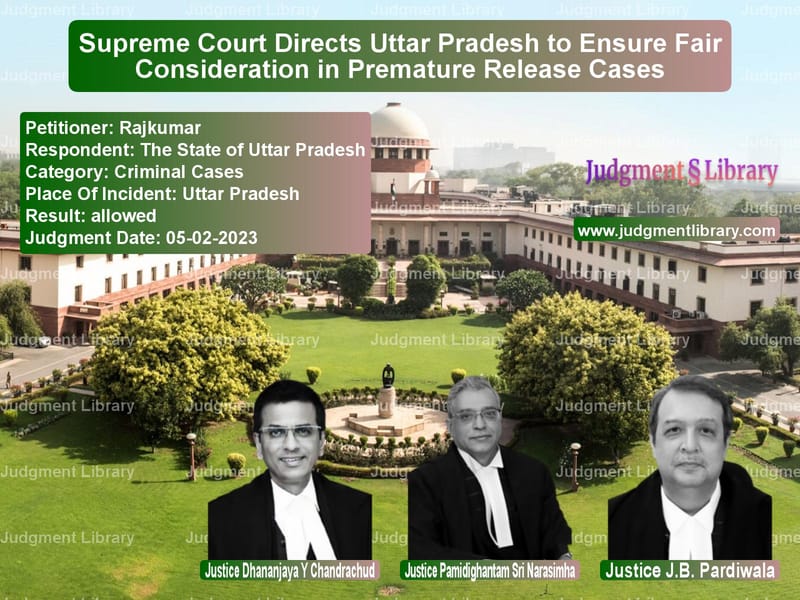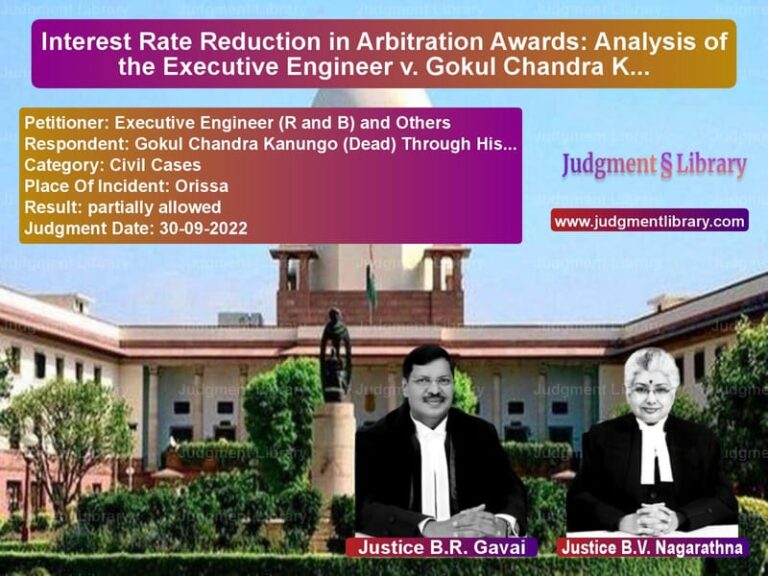Supreme Court Directs Uttar Pradesh to Ensure Fair Consideration in Premature Release Cases
The Supreme Court of India, in Rajkumar vs. The State of Uttar Pradesh, addressed a critical issue concerning the premature release of prisoners in Uttar Pradesh. The judgment, delivered by a three-judge bench, mandated the state government to implement a transparent, non-arbitrary process for considering the early release of eligible convicts.
Background of the Case
The petitioner, Rajkumar, a convict serving a life sentence, had applied for premature release under the provisions of the Uttar Pradesh Prisoners (Release on Probation) Act, 1938. His plea was not considered by the state authorities, prompting him to file a writ petition under Article 32 of the Constitution.
The petition highlighted the broader issue of delays and inconsistencies in the state’s implementation of its premature release policy. The petitioner argued that several prisoners eligible for release under the existing policies were being subjected to an arbitrary selection process.
Legal Framework for Premature Release in Uttar Pradesh
The court examined the various provisions governing premature release:
- Rule 4 of the 1938 Rules: Specifies eligibility conditions, including completion of 14 years of actual imprisonment.
- Section 432 and Section 433A of the Code of Criminal Procedure (CrPC): Provides the framework for remission and commutation of sentences.
- Paragraph 198 of the Uttar Pradesh Jail Manual: Outlines the procedures for maintaining a ‘Nominal Roll’ of prisoners eligible for premature release.
- Standing Policy of Uttar Pradesh (amended in 2022): Lifts the earlier restriction that barred the release of convicts below the age of 60.
Arguments by the Petitioner
The petitioner’s counsel contended:
“Despite fulfilling all eligibility conditions, the petitioner’s case was not considered for premature release, violating his fundamental rights.”
Additional points raised:
- The state government had adopted a selective approach, granting release to some while arbitrarily denying it to others.
- The state authorities had failed to follow the timeline set in previous Supreme Court directives regarding the disposal of premature release applications.
- The policy was being applied inconsistently, leading to discrimination among similarly placed prisoners.
Arguments by the Respondent (State of Uttar Pradesh)
The state government, through its counsel, submitted:
“All applications for premature release are considered fairly and in accordance with the law.”
Key points in defense:
- The government had implemented a mechanism for regular review of cases eligible for release.
- Since the Standing Policy was amended in 2022, certain applications were being reconsidered based on the new criteria.
- Over 3,729 prisoners had been released under various provisions in the last five years.
Supreme Court’s Observations
The Supreme Court took a firm stance on the issue, stating:
“The state must ensure that the policy is implemented fairly and uniformly, without adopting an arbitrary yardstick for picking up cases.”
Key observations:
- The state government must abide by its own policies and apply the same standards to all eligible prisoners.
- The failure to process eligible cases efficiently amounts to denial of the right to equal treatment under Article 14.
- The authorities must ensure that cases for premature release are disposed of without delay and in a transparent manner.
Final Judgment
The Supreme Court directed:
- All pending applications for premature release in Uttar Pradesh must be disposed of by April 30, 2023.
- The Director General of Prisons must submit a compliance report by May 4, 2023.
- The state government must ensure that no prisoner is denied premature release due to procedural delays.
- The state must apply the latest liberalized policy where it benefits the prisoner.
Implications of the Judgment
This ruling sets a precedent for ensuring fairness in premature release cases:
- Eliminating Discrimination: The court emphasized the need for uniform application of policies.
- Reducing Delays: The directive ensures that eligible prisoners are not forced to remain incarcerated due to bureaucratic inefficiencies.
- Upholding Constitutional Rights: The ruling reinforces the principle that no individual should be treated unfairly in the implementation of government policies.
Conclusion
The Supreme Court’s judgment in Rajkumar vs. The State of Uttar Pradesh underscores the importance of transparency and fairness in deciding premature release cases. By mandating strict adherence to policies and ensuring no undue delays, the ruling safeguards the rights of prisoners eligible for early release.
Petitioner Name: Rajkumar.Respondent Name: The State of Uttar Pradesh.Judgment By: Justice Dhananjaya Y Chandrachud, Justice Pamidighantam Sri Narasimha, Justice J.B. Pardiwala.Place Of Incident: Uttar Pradesh.Judgment Date: 05-02-2023.
Don’t miss out on the full details! Download the complete judgment in PDF format below and gain valuable insights instantly!
Download Judgment: rajkumar-vs-the-state-of-uttar-p-supreme-court-of-india-judgment-dated-05-02-2023.pdf
Directly Download Judgment: Directly download this Judgment
See all petitions in Bail and Anticipatory Bail
See all petitions in Juvenile Justice
See all petitions in Custodial Deaths and Police Misconduct
See all petitions in Judgment by Dhananjaya Y Chandrachud
See all petitions in Judgment by P.S. Narasimha
See all petitions in Judgment by J.B. Pardiwala
See all petitions in allowed
See all petitions in supreme court of India judgments February 2023
See all petitions in 2023 judgments
See all posts in Criminal Cases Category
See all allowed petitions in Criminal Cases Category
See all Dismissed petitions in Criminal Cases Category
See all partially allowed petitions in Criminal Cases Category







